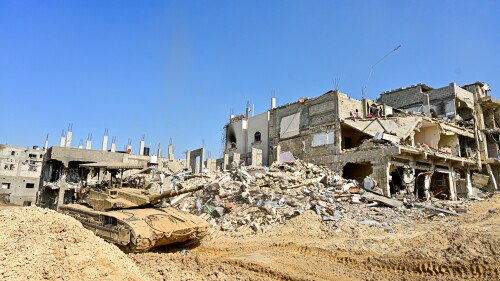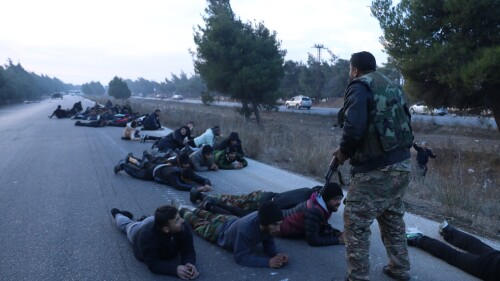Originally published under the title, “A Test Case for Syria’s Kurds.”
A YPG soldier. |
The arrest in a Prague hotel of former Syrian Kurdish PYD (Democratic Union Party) leader Saleh Muslim Muhammad is a test case. Its outcome will establish the extent to which the central role Syrian Kurds have played in the fight against Islamic State has accrued some broader political legitimacy for their leadership and organizations. Czech authorities arrested Muslim over the weekend after a Turkish participant at a conference in Prague took a photograph of him that was published by the Milliyet newspaper.
Turkish authorities had issued an Interpol “red notice” for Muslim after his alleged role in a bombing in Ankara in 2016 in which 29 people were killed. The Turkish government, which may have been aware of the pictures before their publication in Milliyet, contacted the Czechs, who arrested Saleh Muslim last Saturday, a day before he had been due to leave the Czech Republic.
The former PYD leader, who remains among the most prominent and influential of Syrian Kurdish leaders, is set to appear before a Czech court this week. The Turks are seeking his extradition. If extradited, he will with certainty be convicted and might face incarceration for the rest of his life. Kurdish media are calling his capture the Turks’ most significant apprehension of a Kurdish leader since PKK founder and leader Abdullah Ocalan in 1998.
The partnership between the Syrian Kurdish YPG (Peoples’ Protection Units) and the United States and its allies against Islamic State has been one of the most successful and unlikely in recent years.
The partnership between the Syrian Kurdish YPG (Peoples’ Protection Units) and the United States and its allies against Islamic State has been one of the most successful and unlikely in recent years. |
The US built the Syrian Democratic Forces – the main instrument for the defeat of IS in its Syrian heartland – around the YPG. Recent statements by senior US officials have indicated that the US intends to remain committed to its allies in Eastern Syria, and to maintain forces in the part of Syria they control, an area covering some 27% of Syrian territory that includes the country’s main oil and gas fields.
There has always, however, been a very wide discrepancy between the military alliance of the West and the SDF, and the almost complete absence of a political bond.
The Syrian Kurds declared the establishment of the “Democratic Federation of Northern Syria” over their area of control in March 2016. No Western country has recognized or acknowledged this declaration.
The Federation, which is today the governing body in an area where US forces are located, remains entirely isolated diplomatically, even as its armed forces call in US air strikes and work on a daily basis with American Special Forces.
The ties between the PYD and the PKK are at the root of this. The latter has been engaged in a 34-year insurgency against Turkey, demanding autonomy for the country’s Kurds. Both the US and the European Union list the PKK as a terrorist organization. Turkey’s warrant for Saleh Muslim, a non-citizen of Turkey, depicts him as a militant member of the PKK.
Kurdish areas of Syria |
The question now is whether the involvement of the PYD in the war against IS has acquired a degree of de facto legitimacy for Syria’s Kurdish parties in the eyes of the West, even in the absence of formal political recognition. If so, Western pressure on the Czech Republic will lead almost certainly to Muslim’s release, indicating an embryonic, unspoken political alliance now existing between the Syrian Kurdish leadership and the West. This will produce further fury on the part of NATO-member Turkey’s Islamist and increasingly authoritarian leadership.
If not, Muslim will remain in custody and possibly be extradited to Turkey. If this takes place, the Syrian Kurds will conclude that the West has used them as cannon fodder in the war against Islamic State, placing further cooperation between Western and Kurdish forces in Eastern Syria in grave jeopardy. Stay tuned.
Jonathan Spyer, a fellow at the Middle East Forum, is director of the Rubin Center for Research in International Affairs and author of The Transforming Fire: The Rise of the Israel-Islamist Conflict (Continuum, 2011).









